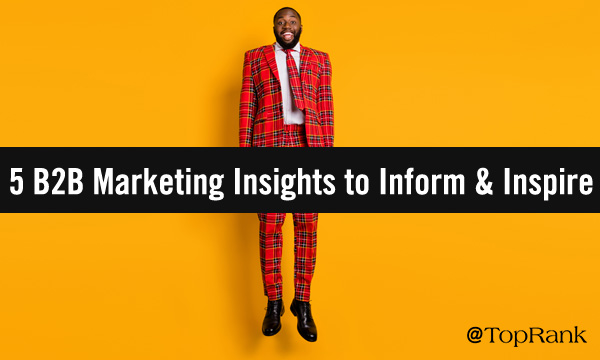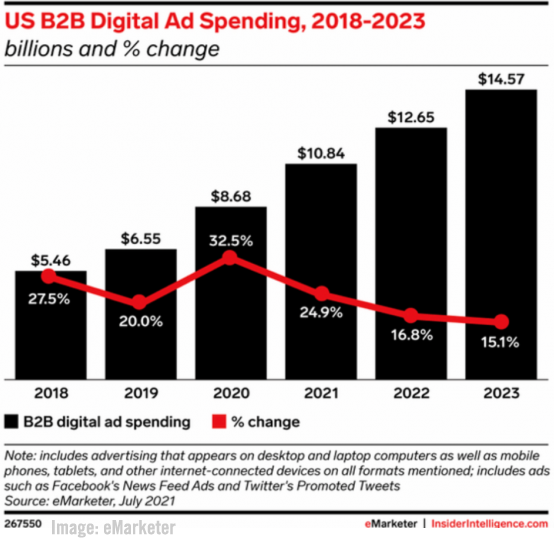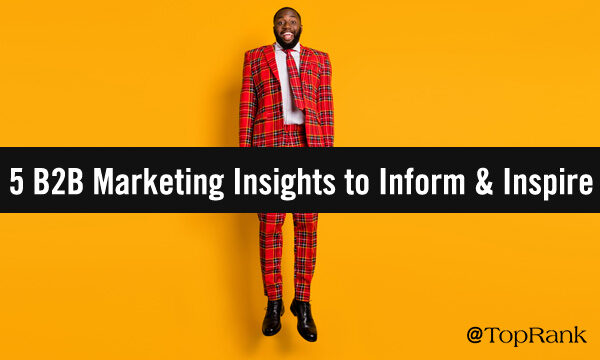
How has B2B marketing changed forever during the pandemic?
The voices and visions of B2B marketing have been forced to shift over the past few years, as have many of the goals and methods we strive for and use to connect with our current and potential customers.
Some of these changes are subtle while others are decidedly not, yet each brings with it both new opportunities for embracing the future of B2B marketing along with risks for those who don’t heed the call when the winds of digital change shift.
Let’s take a look at five of the most substantial changes in B2B marketing that the pandemic has driven, and explore new insights that can inform and inspire your efforts in the push towards 2022 and beyond.
1 — Remote Yet Closer B2B Relationships
The remote Zoom, Slack, phone and email communication we’ve all had to embrace over the course of the pandemic have surprisingly brought closer B2B relationships in many cases.
How being physically distanced from each other has actually brought us together in new and fascinating ways is a phenomenon that will likely be studied for years to come, yet successful B2B marketers have already embraced this shift and are doing everything they can to nurture our new world of remote business relationships in creative digital fashion.
The heart of online communication are the people at either end of the conversation. The particular tools they use come and go like the shifting seasons, and in my 37 years of online digital communication this fact has become more pronounced.
The way our communication tools today are generally able to work together seamlessly is a far cry from the days when I operated a 300-baud computer bulletin board system and each person had to take turns phoning in with their modem. Two formats carried over, however — email and chat — and both are still successfully used today by countless B2B marketers.
Relationships between brands and influential subject matter experts have also taken on new qualities since the pandemic began.
For Ann Handley, chief content officer at MarketingProfs, a new variety of these opportunities has been arising.
“I think in B2B what we’re seeing, and this has been fueled by the pandemic, is that we are seeing those relationships start to happen between brands and influencers like me where they’re reaching out to me proactively and saying, ‘Hey, we don’t have a thing right now, but we want to work with you. Can we sort of get to know each other?’” Ann recently told our chief executive and co-founder Lee Odden in “Inside B2B Influence 14: Ann Handley of MarketingProfs on Content Marketing and Influence.”
“Integrating influencer content is a direct line to building trust and customer confidence.” — Ann Handley @annhandley Share on X2 — A Digital Communications Deluge
Advertisers, consumers, brands and pretty much everyone in between have all had to vastly increase their use of digital communication during these challenging recent years, which has led to more competition than ever to be heard.
For advertisers, the pandemic propelled digital advertising past the 50 percent mark, and the margin between digital and all other formats is now only increasing.
Even among B2B marketers, in the U.S. advertising spending is expected to top $30 billion by 2023, with almost half of that going to digital advertising (eMarketer.)

Just because we have great tools for communicating, however, doesn’t mean we’re using them to full effect in our marketing efforts.
The combined art and science of effective B2B marketing communication is a subject we’ve explored in the following articles:
- 10 Marketing and Communications Leaders to Inspire You in 2021
- Remote Communication Opportunities For B2B Marketers
- The Universal Translator: How Marketers Can Improve Communication with Internal Stakeholders
3 — Heightened Customer Journey Expectations
The touch-points that B2B customers now look for along their purchasing journey in the coronavirus era run from well before the starting line to long past the finish line of sales.
Before the pandemic, B2B buyers had long-standing way-points for predictable interactions with brands.
Now, businesses that rely only on those traditional touch-points for customer interaction risk not being there for their potential customers in the new places buyers expect to find brands — whether it’s a new batch of social media platforms such at Clubhouse, human or chatbot live chat, or text messaging.
The more we can learn about our customers and the digital journeys they set out on today, the better we can get front and center at those key points where we want to provide the best-answer solutions our audience is searching for.
It’s rarely possible to truly be there at every possible spot in today’s vast and circuitous digital routes, even with substantial resources, so it’s important to pick the right locations for meeting your customer on their journey, and to make each one count.
One approach to tackling this complex issue is through the use of account based marketing (ABM), or better yet, account based experiences (ABX), as Lee recently explored in “Is ABX the Next Evolution of B2B Marketing?”
“In many ways, Account Based Experience (ABX) is the next generation of Account Based Marketing. ABX is a fundamental customer centric rethinking of an account based go-to-market.” — Jon Miller @JonMiller Share on X4 — The Natural Shift to Influence
One big winner the pandemic has surfaced for brands, marketers, and customers alike is the enduring power of influence.
It’s no wonder that U.S. influencer spending is set to surpass $3 billion in 2021, an increase of over 33 percent (eMarketer), and that paid branded content and influencer marketing have accounted for 20 percent of 2021 digital advertising budgets, while influence marketing has been seen as the second most important digital ad option for 2021, according to recently-released Advertiser Perceptions survey data.
These past two years are likely to go down as the turning point when influencer marketing truly showed its potential in the world of B2B industries.
We’ve examined this important shift to B2B influencer marketing recently in the following articles:
- Top 5 Benefits of Influencer Marketing for B2B Brands
- Mindful Marketing: 5 Uncommon Ways To Work With B2B Influencers
- 5 Examples of B2B Brands Rocking With Influence in 2021
- 9 Questions to Ask When Hiring a B2B Influencer Marketing Agency
5 — Hybrid Work Hotbeds Go Mainstream
I’ve worked remotely for the past 5,241 days — since March 23, 2007 — and one genie-from-the-bottle change the past two pandemic years has brought is the immense increase in the number of people working remotely around the world.
B2B brands that facilitate remote communication have undoubtedly thrived the past two years, with Zoom and clients such as Slack and monday.com upping their game to make hybrid and remote work a much more friction-free and less frustrating experience.
Digital video too has exploded since the pandemic began, a trend that newly-released forecast data clearly shows, with online video and eCommerce advertising expected to add $40 billion — some 11.2 percent — to advertising spending worldwide, an increase of more than six percent from its peak before the global health crisis.
Professional talent in all areas surrounding the great circle of B2B activity is now more global than ever, and successful firms are strengthening their teams by adding great and diverse voices from the four corners of the digital world.
“The more diverse your workforce is, the better your ideas, innovation, and problem solving are, because you don't have a bunch of heads that look like one another nodding in agreement, which doesn't get us anywhere.” — @TamaraMcCleary Share on XCrank Up & Amplify Your B2B Marketing Voice & Vision
Being mindful of these changes can help make the journey to 2022 and beyond a more successful one, as we move forward towards a future shaped not only by the pandemic but also by the many powerful changes and improvements B2B marketers have crafted.
By cranking up and embracing new closer B2B relationships and the digital realm where they largely reside, savvy marketers will meet those heightened customer journey expectations.
Utilizing the multifaceted power of influence will propel tomorrow’s most successful marketers and B2B brands, all in a new work landscape that will henceforth be far more hybrid and remote.
Crafting award-winning digital experiences and storytelling featuring each of these elements takes significant time, resources, and effort, which is why many of the world’s top B2B brands choose to partner with a leading B2B marketing agency. Contact us today and learn why for more than 20 years brands from LinkedIn and 3M to Dell and Adobe have chosen to work with TopRank Marketing.



